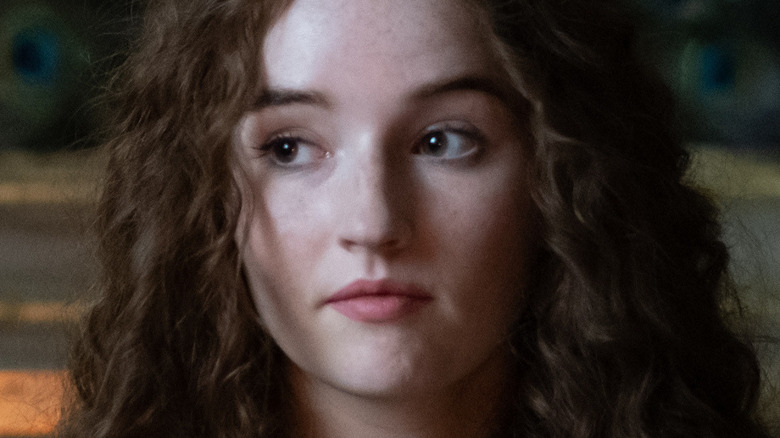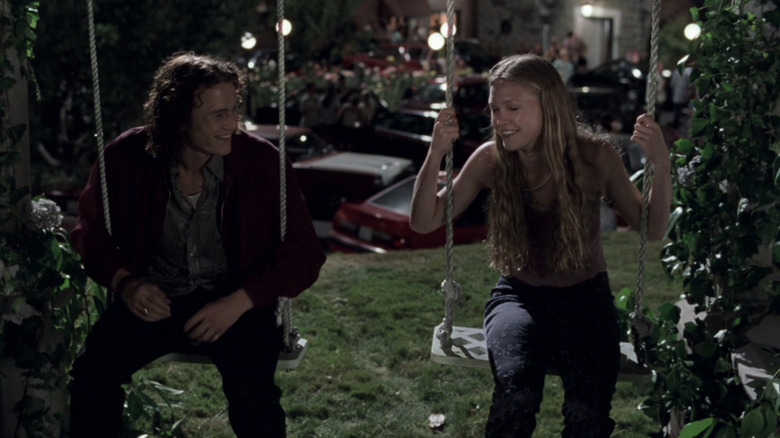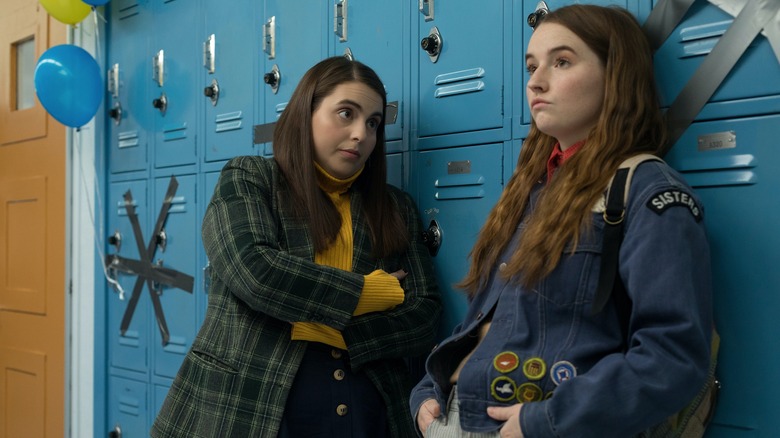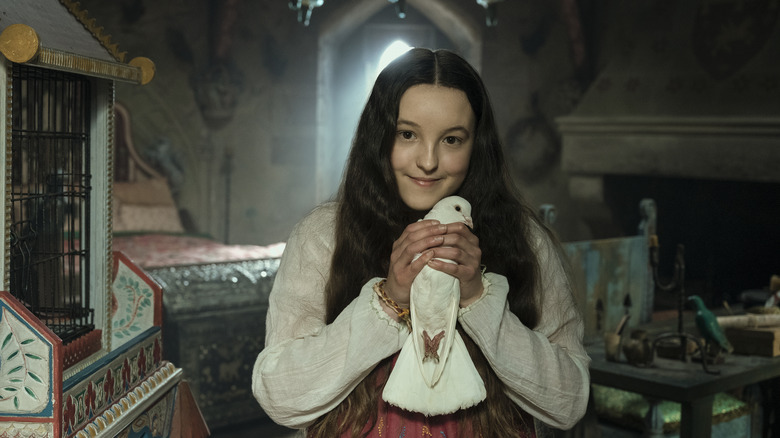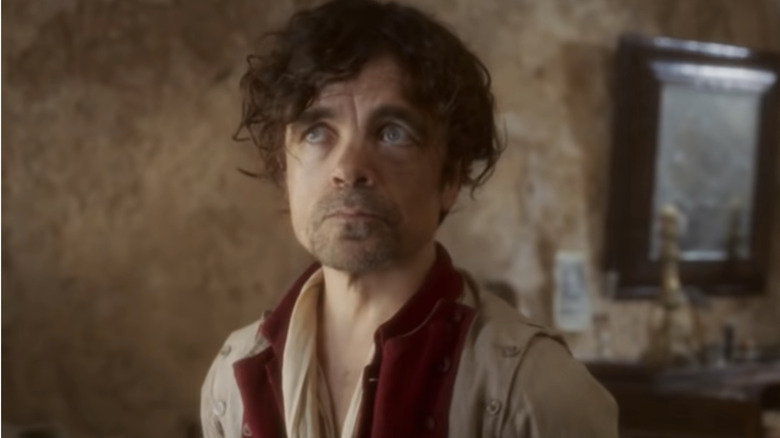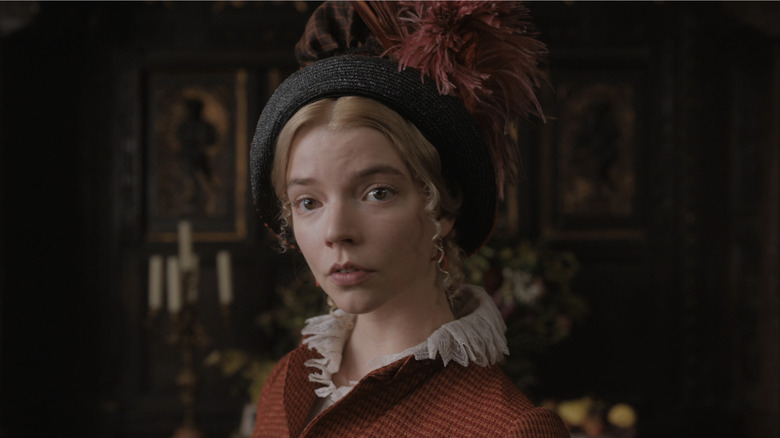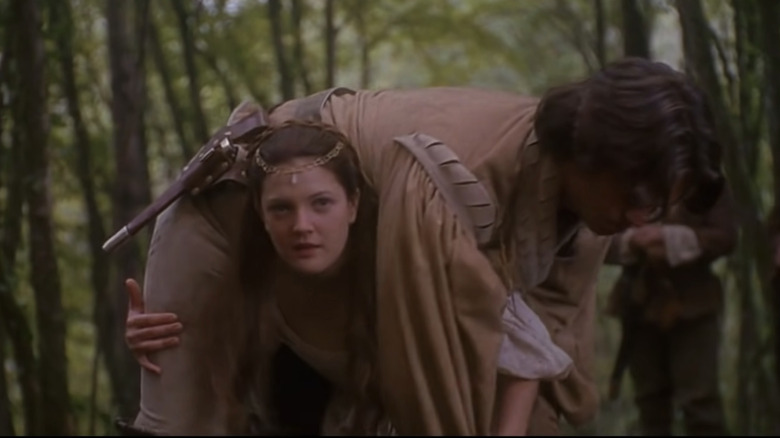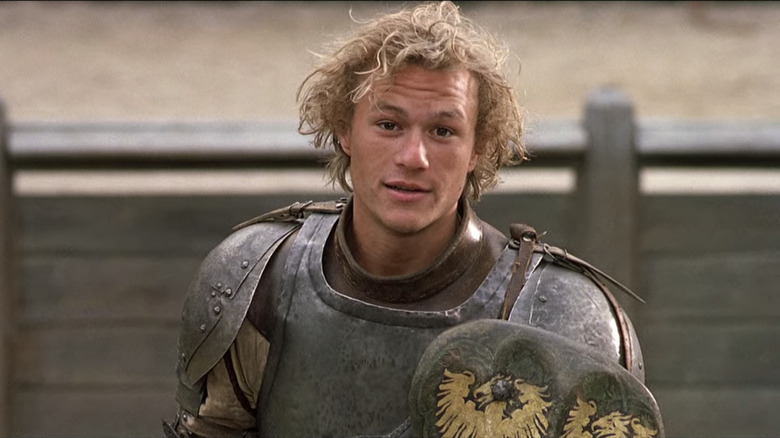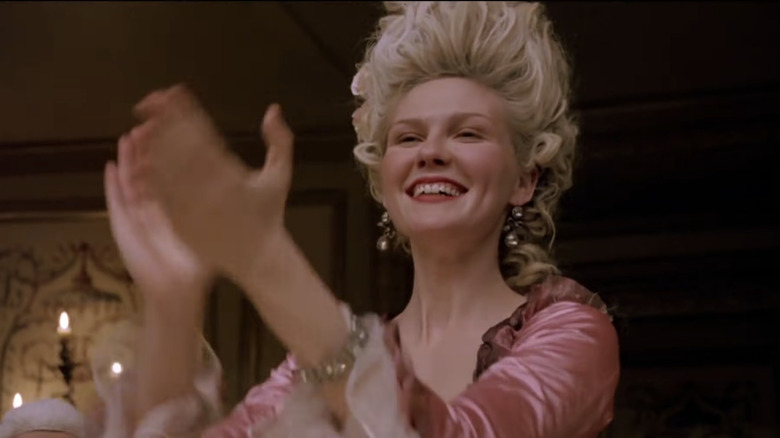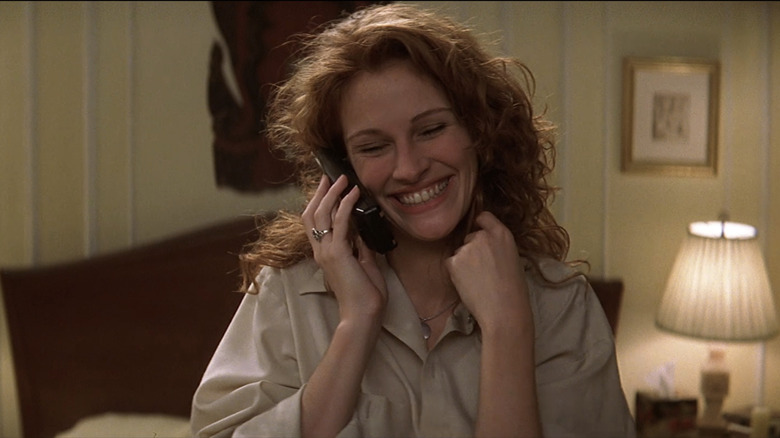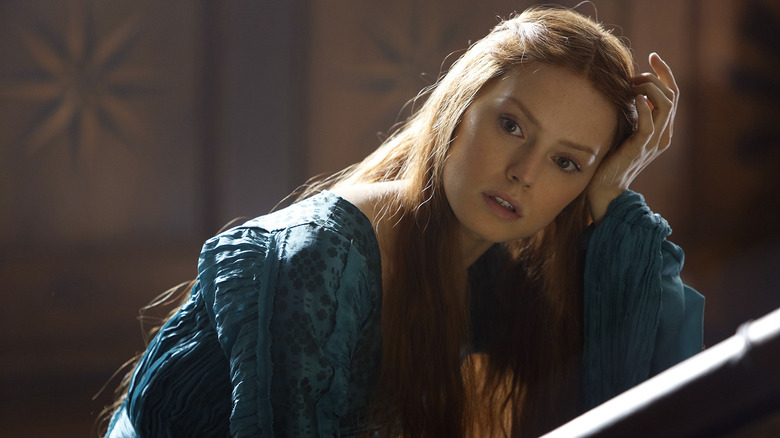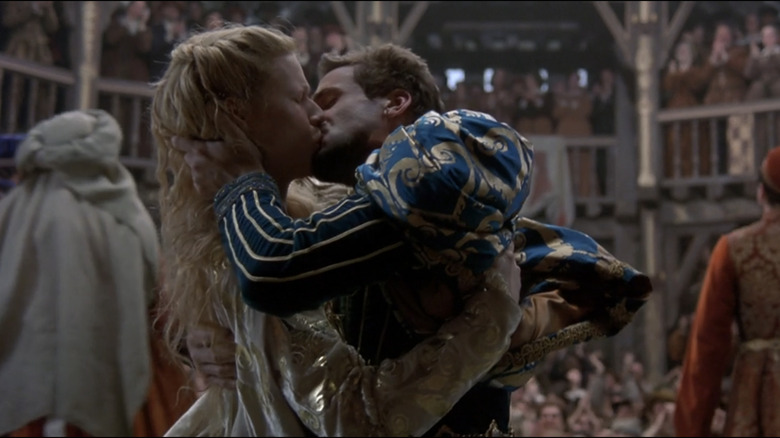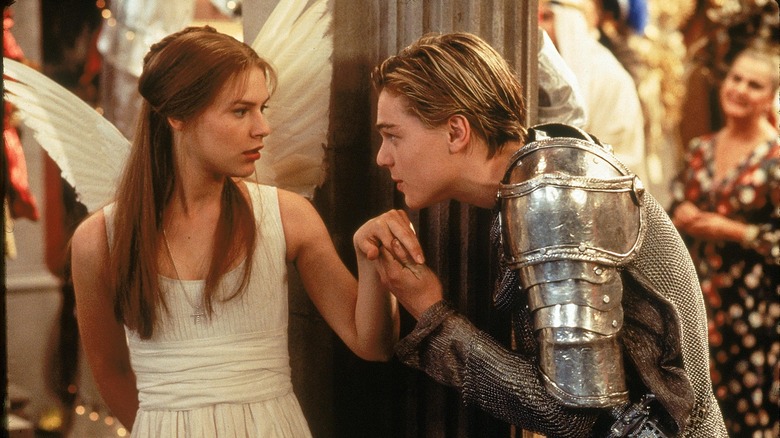The 12 Best Movies To Watch If You Loved Rosaline
The new romantic comedy "Rosaline" tells the oft-told tale of Romeo and Juliet through the eyes of an unlikely protagonist: Romeo's ex. If you had forgotten that Romeo even had an ex, that's understandable. In Shakespeare's play, Rosaline is only referred to a handful of times in the very beginning, and she's never actually seen. Here, though, she is front and center, a bright and progressive young woman (played by Kaitlyn Dever) who falls for the handsome, dim-witted Romeo (Kyle Allen). But when he falls in passionate love with her cousin Juliet (Isabela Merced), Rosaline plots and schemes to break up the star-crossed couple.
Though "Romeo and Juliet" is one of the world's most famous tragedies, "Rosaline" is a comedy through and through. Dever and company may be dressed for Renaissance Italy, but their language (from the writers of "500 Days of Summer") is modern and snarky in a way that feels more akin to 1990s teen comedies, the period spoofs of Bob Hope and Danny Kaye, or even the "Moonlighting" episode "Atomic Shakespeare," in which Bruce Willis delivers a soliloquy and performs "Good Lovin'" by the Young Rascals. Here are some other great films — both old and new, comedies and even a few dramas — to watch once you've seen "Rosaline."
10 Things I Hate About You
"Rosaline" feels like a throwback not just to the Elizabethan age but to the Clinton era as well, specifically the late 1990s mini-boom of teen comedies adapted from classic works of literature. 1995's Jane-Austen-meets-Beverly-Hills mashup "Clueless" is the first (and arguably the best) of these, but 1999's "10 Things I Hate About You" is a classic in its own right. A contemporary take on Shakespeare's "The Taming of the Shrew," the film follows high schooler Cameron (Joseph Gordon-Levitt) as he pines for the beautiful Bianca (Larisa Oleynik). But Bianca can't date unless her older sister Kat (Julia Stiles) dates first, so Cameron enlists bad boy Patrick (Heath Ledger) to woo Kat so that he can woo Bianca in turn.
What's fascinating about this subgenre of teen flick is how few changes are really necessary to translate the world of Austen or Shakespeare into a modern-day high school. The film is remarkably faithful to its source material, and manages the tricky feat of taking Kat's strident feminism seriously while also playing it for laughs. If nothing else, the film is well remembered for providing both Stiles and Ledger with their breakthrough roles, ensuring its sleepover classic status for years to come.
Booksmart
Kaitlyn Dever has been lighting up the small screen since she was a teenager, in projects as diverse as the Tim Allen sitcom "Last Man Standing," "Justified," and the Hulu miniseries "Dopesick." In film, her biggest role prior to "Rosaline" was in Olivia Wilde's 2019 indie hit "Booksmart," as one-half of a pair of high school overachievers who have a single night to catch up on four years' worth of partying. Amy (Dever) and Molly (Beanie Feldstein) have spent their entire academic careers following the rules with the goal of getting into good colleges. But when they discover that the "bad" kids who they've looked down on also got into Ivies (or were recruited for six-figure tech jobs, skipping college altogether), the co-dependent best friends put their Type-A personalities to work on the last night before graduation, making up for all the fun they missed out on.
Amy and Molly's raunchy night that reveals cracks in their seemingly indestructible friendship drew a lot of comparisons to "Superbad," the 2007 comedy starring Feldstein's older brother Jonah Hill. But while the two films share a similar premise and bittersweet outlook on teenage friendships, the experience of watching them is quite different, in no small part due to the fact that "Booksmart" is centered around its female characters — not just Amy and Molly, but also Billie Lourd as the girls' seemingly magical guide to the world of late night debauchery.
Catherine Called Birdy
The problem of weary fathers attempting to marry off their assertive daughters has powered many a story over the centuries, from "The Taming of the Shrew" to Disney's "Aladdin." In "Rosaline," the heroine's father (Bradley Whitford) is compelled to find his daughter a husband because, as a woman in her late teens, she is fast approaching spinsterhood. In Lena Dunham's 2022 adaptation of the young adult novel "Catherine Called Birdy," though, medieval English Lord Rollo (Andrew Scott) has more pressing financial motivations for betrothing his 14-year-old daughter Catherine (Bella Ramsey, best known as the imperious Lyanna Mormont on "Game of Thrones").
Lord Rollo and his wife Lady Aislinn (Billie Piper) are broke. They can no longer afford the upkeep of their estate and need the influx of cash and status that would come with marrying Catherine to a wealthy nobleman. The only problem is that "Birdy," like Kat, Rosaline, and Jasmine before her, is not the marrying kind, and would rather tend to her birds and play with the pigs than be some stranger's wife. Dunham's film is not as much of a spoof as "Rosaline" can be at times, but she brings the same modern sensibility, highlighting not just the miserable lot that even noble young women faced in the 13th century, but the ways that some things haven't changed much.
Cyrano
Though not as famous a tale of thwarted love as "Romeo and Juliet," Edmond Rostand's 1897 play "Cyrano de Bergerac" has inspired its fair share of film and stage adaptations over the years, from José Ferrer's 1950 classic to Steve Martin's modern take "Roxanne" from 1987. A cultured, clever, and formidable nobleman who believes himself unworthy of love thanks to his preposterously long nose, Cyrano woos the lovely Roxanne under the guise of his fellow soldier, the more conventionally handsome but terminally dull Christian.
In 2018, playwright Erica Schmidt teamed up with her husband Peter Dinklage, as well as Aaron and Bryce Dessner of the band The National, to create a new musical adaptation of Rostand's play, titled simply "Cyrano." A film adaptation of their musical, directed by Joe Wright and starring Dinklage in the title role, came out in 2021. Like Kenneth Branagh's 1993 take on "Much Ado About Nothing," the film takes place in a colorblind fantasy version of Renaissance Europe, with styles spanning the 17th to 19th centuries. The Dessners' songs are not Broadway showstoppers, but more gentle meditations on love and loss. Roxanne (Haley Bennett) is an excellent not-quite-damsel and Christian (Kelvin J. Harrison) is less of a buffoon than in the original story, but the film belongs to Dinklage, who creates a poignant interpretation of Cyrano's insecurity.
Emma.
Jane Austen's "Emma," the story of a wealthy society girl who meddles in the romantic lives of everyone around her, has been told and retold many times over the decades. No less than three different adaptations were produced between 1995 and 1996: The Alicia Silverstone modern-day hit "Clueless," a more traditional period film starring Gwyneth Paltrow, and a British television movie starring Kate Beckinsale. In 2020, director Autumn de Wilde reintroduced the young, privileged Ms. Woodhouse to cinema screens in the candy-colored "Emma." The added period to the title gives a sense of the film's dry, slightly twee sense of humor (courtesy of Eleanor Catton”s script), as well as a sense of ambition, as if it wasn't just an adaptation of "Emma," but the adaptation.
Starring an ascendant Anya Taylor-Joy as the eponymous matchmaker and Bill Nighy as her hypochondriac father, the film follows Austen's novel closely, as Emma endeavors to pair up her friend Harriet with young minister Mr. Elton, a ploy that has disastrous consequences. Well, not too disastrous — the plot is as feather-light as de Wilde's cheerful visual compositions and pastel color scheme. Emma, like Rosaline, learns a valuable lesson about interfering in other people's relationships, and finds a much better match for herself (Johnny Flynn's Mr. Knightley) than the original object of her desire.
Ever After: A Cinderella Story
Decades before Lily James and Camila Cabello donned their own magical dresses and glass slippers, Drew Barrymore gave us the model of a modern, resourceful Cinderella in 1998's "Ever After." Part of a spate of 1990s romantic swashbucklers like "Robin Hood: Prince of Thieves" and "The Mask of Zorro," full of derring-do and dodgy accents, the film presents itself as the "real" version of the Grimm fairy tale, the story of Danielle de Barbarac, the orphaned daughter of a wealthy merchant who has been made a servant in her own home by her cruel stepmother (Anjelica Houston, chewing every bit of scenery). But when she falls for the handsome (and unhappily betrothed) Prince Henry (Dougray Scott), she pretends to be an aristocrat, using the name of her sainted mother.
Barrymore's Cinderella is no waif waiting for her prince to come, but a progressive, empathetic individual who quotes Thomas More and advocates for the rights of peasants; Henry is bewitched not just by her beauty but the novelty of a woman who speaks her mind and doesn't seem inclined to swoon at his feet. This Cinderella doesn't have a fairy godmother and helpful mice to prepare her for the big ball, but someone ever so slightly more realistic: Leonardo de Vinci (Patrick Godfrey), visiting from Italy as a guest artist in the royal court, who takes time out of developing boat shoes to aid Danielle in landing the prince and restoring her family's honor.
A Knight's Tale
If "10 Things I Hate About You" didn't turn Heath Ledger into a world-class dreamboat, then it was certainly 2001's "A Knight's Tale," a delightfully goofy medieval sports movie filled with stadium rock tunes and several scenes of Ledger romancing Shannyn Sossamon. Writer-director Brian Helgeland (who adapted "L.A. Confidential" and directed the Jackie Robinson biopic "42") applies modern-day underdog cliches to the world of jousting, as medieval squire William (Ledger) dreams of becoming a champion, but is held back by his station. After assuming the identity of a foreign nobleman, William and his crew (Mark Addy, William Tudyk, and Laura Fraser) quickly rise through the ranks of professional jousters, attracting the attention of rival Count Adhemar (Rufus Sewell) and the lovely maiden Jocelyn (Sossamon).
Like "Rosaline," the film gets a lot of comic mileage from the distance between the medieval setting and the character's modern sensibilities. A courtly dance set to David Bowie's "Golden Years" is a particular highlight, and the soundtrack for the jousting matches — featuring Queen's "We Will Rock You" and Thin Lizzy's "The Boys Are Back in Town — wouldn't sound out of place in a contemporary football game. And like "Ever After," William's rise to glory is aided by a real-life legendary figure: Poet Geoffrey Chaucer (Paul Bettany), who serves as William's hype man, announcing him before every tournament like a champion boxer.
Marie Antoinette
Writer-director Sofia Coppola's most frequent topic has always been the interior lives of privileged young women, from Scarlett Johannson's adrift newlywed in "Lost and Translation" to the bored rich teens of "The Bling Ring." That topic found its richest subject in 2006's "Marie Antoinette," her indie rock retelling of the short life of France's ill-fated queen. Like many of the young women on this list, Marie (Kirsten Dunst) was essentially born to be married off for power and riches, but unlike Kat and Rosaline, she could not escape this fate, ultimately wedded to the Dauphin of France (Jason Schwartzman) and whisked away into the opulent world of pre-revolutionary Versailles while still a teenager.
The film was notable at the time for the ways it flouted the conventions of traditional biopics via anachronistic elements, like its effortlessly hip soundtrack or the scene where a pair of lavender Chuck Taylors is snuck into an endless assortment of 18th-century footwear. Where many period pieces attempt to cast actors with a classical or timeless quality, Coppola's cast is almost aggressively modern, particularly Rip Torn as the king and Schwartzman as his heir, who couldn't come across as more 20th-century American if they tried. Dunst finds sympathy and innocence in a character who is primarily remembered as a heartless elite — even the film's take on "let them eat cake" has more cluelessness than malice to it.
My Best Friend's Wedding
Romantic comedy heroines are rarely unlikeable. They might be prickly or standoffish, but they usually have good reason to be, and they melt when the right partner comes along. It isn't every day that a rom-com asks us to actively disapprove of its main character, but it does sometimes happen. "Rosaline" walks right up to this line in its first half, as Rosaline schemes to win back Romeo by manipulating her cousin Juliet. But the film pulls its punch, as Rosaline eventually realizes that Romeo and Juliet are destined to be together (in life or death), and that she's already met the perfect guy for her, sailor hunk Dario (Sean Teale).
One film with a similar plot that does not pull its punch is 1997's "My Best Friend's Wedding," starring Julia Roberts as a woman who realizes that her longtime bestie (Dermot Mulroney) is actually the man of her dreams — right as he gets engaged to a flighty socialite (Cameron Diaz). Her efforts to break up the happy couple take Roberts' character to some surprisingly unsavory places, but because it's Julia Roberts, the audience is unsure of whether she will be successful or not, or if we even want her to be. The film also stars Rupert Everett in one of the great "gay best friend" performances of all time — "Rosaline" resurrects that particular trope with Spencer Stevenson's Paris.
Ophelia
"Rosaline" is not the first work to imagine a Shakespeare play from a supporting (or nonexistent) character's perspective: The author of perhaps the most famous example is next on this list. 2018's "Ophelia," based on Lisa Klein's 2006 novel, watches the events of "Hamlet" through the eyes of Hamlet's tortured love (Ophelia). Though not quite as revisionist as "Rosaline" — this is still a tragedy, and nearly everyone who dies in the play still dies here — "Ophelia" expands on the supernatural elements of its source material and introduces a world of women whose work goes unseen. As Hamlet (George Mackay) feigns madness while investigating the death of his father the king of Denmark, Ophelia's work as an aide to Queen Gertrude (Naomi Watts) leads her to discover the truth of the king's death: That he was murdered by his brother Claudius (Clive Owen) with poison obtained from Gertrude's secret twin sister, a forest witch.
The film's plot buckles under its own weight, balancing not just "Hamlet" and its own original elements, but also pieces from other Shakespeare works. Watts' witch character calls to mind the Weird Sisters from "Macbeth," and a character's use of a potion to fake their own death is of course lifted from "Romeo and Juliet." But Ridley breathes new energy into a role that is all too often limited to weeping and then dying on stage, and there's something poignant in the idea that she finds a way to break free of her destiny and chart a new course, while the men in her life race heedlessly toward their predestined doom.
Shakespeare in Love
Playwright Tom Stoppard arguably invented the modern Shakespeare rewrite with his 1966 absurdist comedy "Rosencrantz and Guildenstern Are Dead," which follows Hamlet's dim-witted university friends during the times when they are not in a scene from "Hamlet." Thirty years later, he returned to the bard's life and work for the 1998 Oscar-winner "Shakespeare in Love." Starring Joseph Fiennes as young Will, leading a disreputable ensemble of actors at the Globe Theatre and struggling to write his latest play (currently titled "Romeo and Ethel the Pirate's Daughter"), the film is not just a love letter to Shakespeare, but to the entire art of theatre and the madmen who attempt to create it.
And it is mad men, as women were forbidden to act on stage in the Elizabethan age, a fact that rankles noblewoman Violet de Lesseps (Gwyneth Paltrow). A talented actor and an admirer of Shakespeare's work, Violet disguises herself as a man, Mr. Thomas Kent, in order to audition for him. Soon, Will is playing Romeo to Mr. Kent's Juliet, and as his love affair with Violet grows, the rush of emotions he feels finds its way into the script. But Violet is engaged to a wealthy lord (Colin Firth) who is bound for the New World colonies, and the stage is still no place for a woman at this time. Their love is doomed to be short-lived from the start, not unlike a certain other couple we could mention.
William Shakespeare's Romeo + Juliet
There are any number of "Romeo and Juliet" film adaptations that could have gone on this list, from the 1954 version starring Laurence Harvey and narrated by Sir John Gielgud, to Julian Fellowes' odd 2013 film that adapts Shakespeare's language in a way that removes the poetry but is still made to sound old-timey. Visually, "Rosaline" most resembles Franco Zeffirelli's lush 1968 classic starring Olivia Hussey and Leonard Whiting, but from a narrative perspective, it has more in common with Baz Luhrmann's in-your-face 1996 version starring Leonardo DiCaprio and Claire Danes. Both are able to find the humor in Shakespeare.
To be clear, Luhrmann's film (stylized as "William Shakespeare's Romeo + Juliet") takes itself very seriously. DiCaprio and Danes are both doing the hard, serious work of making the Bard's language sing for an audience raised on MTV, while Luhrmann's visual maximalism makes the film feel like a two-hour cologne commercial. But as in "Rosaline," the real magic is in its side characters, like John Leguizamo's flamboyant psychopath Tybalt, Paul Rudd's hilariously milquetoast Paris, and the X-Games goofballs who make up the Montague gang, played by Zak Orth and Jamie Kennedy. Basically, everyone except for Romeo and Juliet is having the time of their lives.
